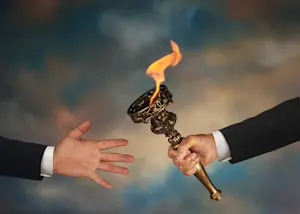What Makes This Word Tick
"Concomitant" might just sound like the sophisticated cousin of "sidekick," and you wouldn't be too far off. It's all about things that occur together, whether it’s good friends or a pesky duo like thunder and lightning. This word adds a touch of elegance to anything that goes hand-in-hand.
If Concomitant Were a Person…
Imagine Concomitant as that charming dinner guest who always arrives with a delightful plus-one. You never invite them to the party without expecting their impeccably dressed spouse right behind, ready to keep you entertained with stories that perfectly complement each other's tales.
How This Word Has Changed Over Time
While "concomitant" has largely retained its meaning, it has transitioned from dusty academic tomes to the language of everyday life. What was once primarily found in scholarly works now pops up wherever paired phenomena need a label, proving that some old dogs do learn new tricks.
Old Sayings and Proverbs That Use Concomitant
Though proverbs have rarely featured "concomitant," the essence of the word is captured in phrases like "birds of a feather flock together." It’s all about the natural pairing of events or characteristics that seem destined to team up.
Surprising Facts About Concomitant
"Concomitant" first entered the English language in the late 15th century. It might surprise you to learn that it shares roots with the word "accompany," both stemming from the Latin "comit" meaning "companion." It’s a word with a rich history of hanging out with interesting company.
Out and About With This Word
Next time you hear someone talking about the cherry on top of a sundae, remember that in the world of linguistics, the cherry and sundae might just be concomitants—complementary elements that enhance the whole experience.
Pop Culture Moments Where Concomitant Was Used
This isn't a word you’ll hear from a Hollywood blockbuster, but you might spot it in a well-scripted drama or read it in a novel. It’s the sort of word a character like Sherlock Holmes might slip into conversation, illustrating his intellectual prowess.
The Word in Literature
Concomitant finds a cozy home in the pages of literary fiction and non-fiction alike. Writers use it to elegantly signify that two events or qualities naturally occur in tandem, adding a layer of sophistication to their prose.
Moments in History with Concomitant
The concept of concomitant events was vividly illustrated during the Industrial Revolution—an era where technological progress and social change marched hand in hand. These were times when innovation and upheaval were inseparable companions.
This Word Around the World
Different languages capture the essence of "concomitant" in unique ways. In French, you’d say "concomitant," too, which is borrowed directly from Latin. Whether it’s "concomitante" in Portuguese or "zusammenhängend" in German, the concept of things happening together is universally recognized.
Where Does It Come From?
"Concomitant" hails from the mid-16th century, through French from the Latin "concomitant-", which means 'accompanying.' It's a word as old as time that links phenomena in a neat, linguistic package.
How People Misuse This Word
Sometimes mistaken for “concurrent,” people may use "concomitant" to wrongly describe parallel events without a relational context. Remember, concomitants don't just coexist; they influence and enhance one another.
Words It’s Often Confused With
Concurrent: Refers to events happening at the same time, not necessarily related.
Subsequent: Follows another event; not necessarily simultaneous or related.
Corollary: Often follows logically from another statement or event, a more mathematical cousin.
Additional Synonyms and Antonyms
Synonyms for concomitant include "accompanying," "attendant," and "collateral." On the flip side, antonyms might be "unrelated" or "independent."
Want to Try It Out in a Sentence?
"The opening night of the art exhibit was accompanied by the concomitant excitement that always accompanies such highly anticipated events." This word pairs beautifully with moments of joint experience, enhancing your expression with its elegance.
















